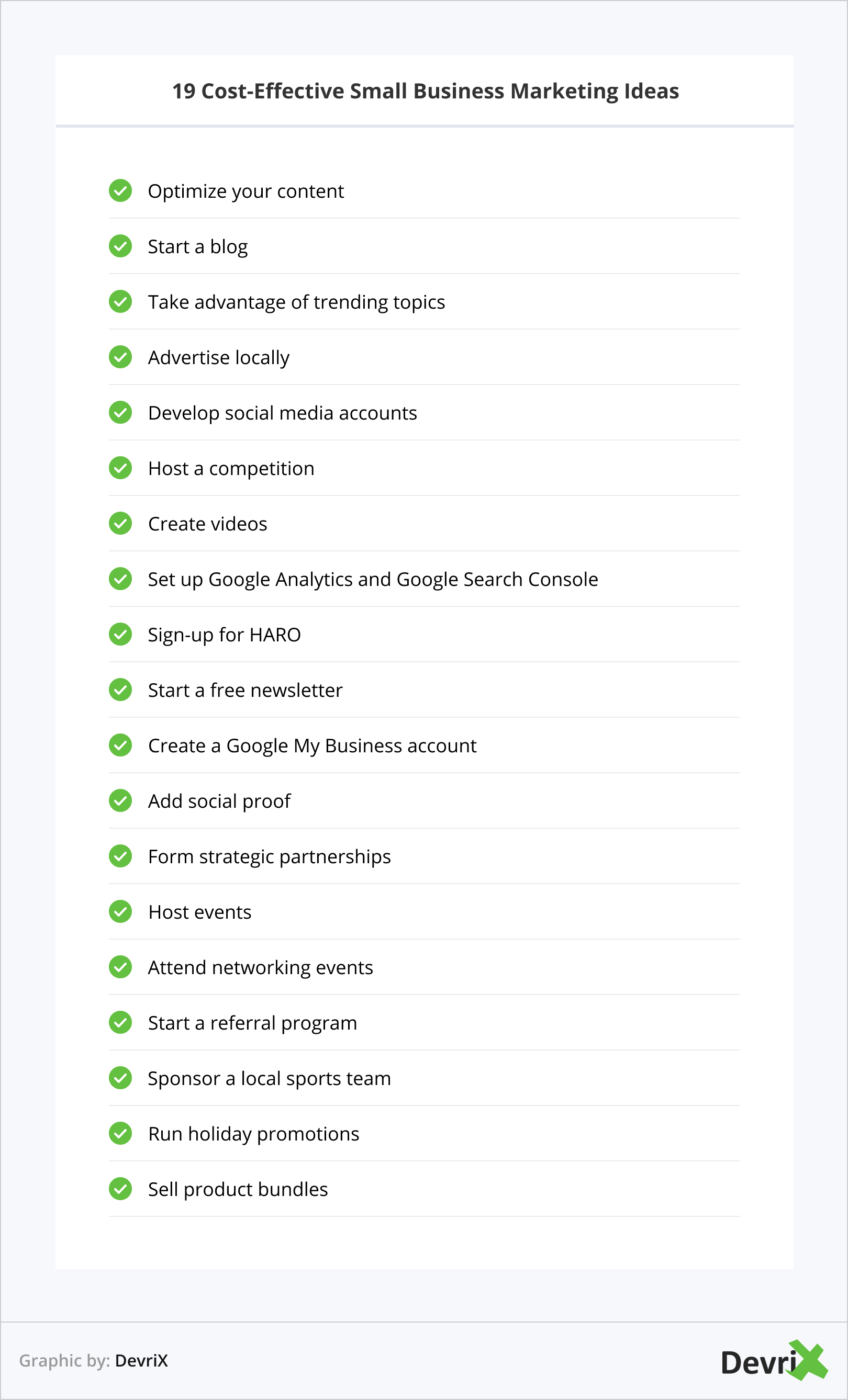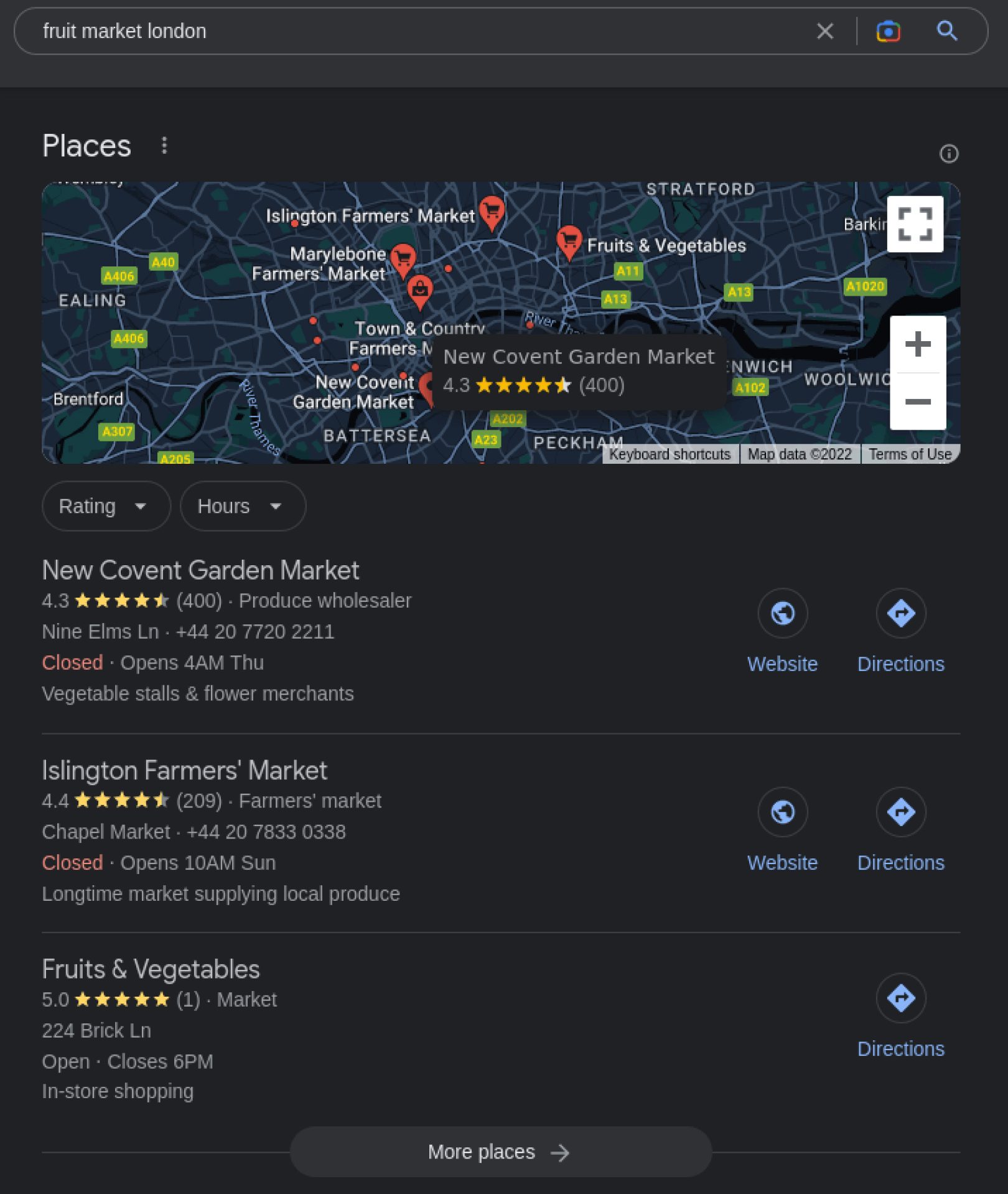Every business needs marketing, and small businesses are no different. However, the difference comes from the fact that small businesses often cannot afford to spend hundreds of thousands of dollars on marketing. Thus, small business marketing ideas need to be creative and bring positive results for little-to-no cost.
In reality, 47% of small businesses spend less than $10,000 on digital marketing.
Sounds great, right? But how do you do it?
Let’s find out.
19 Cost-Effective Small Business Marketing Ideas

- Optimize your content.
- Start a blog.
- Take advantage of trending topics.
- Advertise locally.
- Develop social media accounts.
- Host a competition.
- Create videos.
- Set up Google Analytics and Google Search Console.
- Sign-up for HARO.
- Start a free newsletter.
- Create a Google My Business account.
- Add social proof.
- Form strategic partnerships.
- Host events.
- Attend networking events.
- Start a referral program.
- Sponsor a local sports team.
- Run holiday promotions.
- Sell product bundles.
1. Optimize Your Content
In practice, SEO costs you nothing, but can bring great benefits in return. Most of the time, small businesses focus on their local market. So you should try to find such keywords to optimize your site around that make sense to your target audience.
Plus, it won’t make much sense to optimize for a very high-volume keyword, where the user search intent is more globally-focused.
Let’s say you run a store that sells board games, and you’re situated in Chicago. If you try to focus on the keyword “board games”, it will not work well for you.
It’s too broad, and chances are, people are more interested in results that are more specific – what are board games, where to find board games, how to play board games, and so on.
Instead, it would be much better to try to rank for keywords like “board games Chicago”, “board game store Chicago”, and “where to buy board games Chicago”.
2. Start a Blog
Why wouldn’t you have a blog? It makes sense to have one in 9 out of 10 cases. Starting your own niche blog, focused around the products/services you offer, can be of great value to your business, and to readers.
Taking our example from above, your blog can be full of articles like “Board games for beginners”, “Board games for the entire family”, “Tips for Dungeons and Dragons”, etc.
You might think that won’t be too helpful from a business perspective, but you are wrong. In fact, it’s one of the best low cost marketing ideas for small businesses. You see, a user might visit your website just to read information about a game they were looking for.
Although, they might just end up on your site out of the blue, click on a CTA button you’ve set up, and ultimately become your customer. All out of nowhere!
What’s more, writing high-quality content on topics you are a specialist in, will also help you increase your chances of ranking higher in SERPs, and therefore gaining more online visibility and traffic.
3. Take Advantage of Trending Topics
The first step is to find the right trending topics. Of course, if your business is oriented towards making baked goods, you won’t be writing about the college football play-offs (unless you’ve made football themed cookies, which is a great idea – please feel free to use it).
The point is, trending topics can bring in loads of customers, generate traffic to your website, and increase your users’ engagement. Which business wouldn’t want to have those?
4. Advertise Locally
As established, most small businesses work on a local level, therefore it only makes sense to advertise in local media – TV channels, newspapers, online media, radio, etc.
This may seem like a retro way of promoting your business, but the facts indicate that it still works. For example, 53% of people are influenced by newspaper ads, and print ads, in general, remain the most trustworthy form of advertising, with 82% of consumers stating they trust them most when it comes to buying decisions.
5. Develop Social Media Accounts
Social media is where everyone is – it’s probably the easiest way to connect with your current and potential customers.
Having said that, there are more than 130 social media platforms currently in existence, and it’s impossible to dedicate equal time and effort to all of them.
It’s best to research where most of your target audience likes to spend their time, and respectively, invest most of your efforts there.
6. Host a Competition
Social media giveaways are always a great way to get people talking about your business. On top of that, who doesn’t want to win a free reward in return for liking or sharing a post/page?
From a business perspective, you get tons of free traffic, new followers, free brand exposure, and maybe even new clients.
What’s more, you can use this opportunity to gather user-generated content, which is very important for brands, since it allows you to see yourself from the perspective of a user, and that can affect how you make you react to consumer buying decisions.
7. Create Videos
Nowadays, you don’t need expensive equipment to shoot a video. You will be perfectly fine just using your smartphone, and doing some basic editing using a video maker tool, if necessary.
The thing is, videos are the most preferred form of content – users spend roughly 19 hours a week watching videos. And you needn’t create super long videos initially, or at all. Quite the opposite, recent trends from YouTube Shorts, and TikTok indicate that people prefer to watch short videos that grab their attention.
Creating your own YouTube channel is also optional, although it’s good to have. After all, you can upload videos to various social channels like Facebook, TikTok, Instagram, etc.
8. Set Up Google Analytics & Google Search Console
Do you know how your website is performing, the amount of incoming traffic, the average session duration, or other important parameters? You need to have Google Analytics and Google Search Console.
Both platforms can provide you with detailed insights regarding your click-through rates, impressions, bounce rates, user demographics, SERP positions, and much more.
Basically, you’ll really be missing out on a lot, if you don’t set them up. It won’t take you too long to do so, “just do it”, as the famous slogan says.
9. Sign Up for HARO
HARO is a platform that connects journalists and bloggers with sources. Here’s how: once you sign up, you receive emails with queries, which you can respond to. In the case that, the outlet likes your response, they will include it in their article, and mention your name and/or business.
That’s free exposure for your business. Of course, you should be an expert in your industry, so that your responses have authority and trustworthiness. Otherwise, you won’t be taken seriously, and your chances of getting featured will be lowered.
All in all, though, HARO is a free and easy way to get featured on the news.
10. Start a Free Newsletter
A newsletter can help you connect with more customers, boost your content marketing, and keep people engaged.
Basically, it’s a very efficient marketing idea for a small business, since it’s quite low-cost, if not completely free, and you can present your products/services, and other content from your website.
A quick tip on how to get more people to subscribe to your newsletter: include coupons or vouchers, as well as other newsletter-exclusive materials.
11. Create a Google My Business Account
One of the best ideas on how to market a small business is to create a Google My Business account. First, it’s free. Second, it gives you free exposure and allows your business to show up on Google Maps, knowledge panels, and Google searches.
Here’s an example. When Googling for “fruit market London”, this is the first thing users see:

Immediately, users obtain information about the location, working hours, reviews, and the website of the featured stores. Naturally, there are certain steps you can take to optimize your Google My Business, and show up higher in local searches.
12. Add Social Proof
Social proof matters. In fact, after reading positive reviews, 57% of users visit a company’s website. What’s more, 63% state they’re more likely to purchase a product from a website with product ratings and reviews, compared to a site that doesn’t have such features.
So, whenever you can, ask your customers for reviews and feedback. Include those on your social media platforms and websites. And don’t be afraid to address negative reviews – doing so will be a clear signal that you care what your customers think, and that you’re looking to improve your business.
13. Form Strategic Partnerships
Strategic partnerships have the goal of two businesses combining forces to acquire more customers, reach new markets, and ensure the growth of both organizations at a lower cost.
Don’t form a partnership, if it doesn’t make sense. Only approach the agreements that would be both beneficial to your organization and your customer-base.
If you own a local bar, you could, let’s say, collaborate with a small business that produces craft beer.
14. Host Events
If you have the resources, you can plan to host an event. It should be something related to your business industry that will attract potential customers and educate them about your products and services.
The ultimate goal is to advertise your company, but offer great value to those that attend as well. Make sure to inform the local community about your event beforehand by giving out flyers, sharing the news on social media, mentioning it in your weekly/monthly newsletter, etc.
15. Attend Networking Events
What better way to promote your business than to go to places where you can meet existing and potential customers, as well as, prospective partners?
Briefly put, be active, attend various networking sessions, and go to local events like Sunday markets, fairs, and so on. Always bring your own branding materials with you – business cards, brochures, and the likes.
You never know when the opportunity will arise to impress someone that could be helpful to your business endeavors.
16. Start a Referral Program
Want to encourage your customers to help bring in additional profit? Start a referral program! It’s one of those low cost marketing ideas for small businesses that can do you no wrong.
Affiliate marketing is a win-win for all parties involved, as a business owner, you get more customers, while the people who refer others to you, get a reward in return – be it a discount voucher, a gift, and so on.
17. Sponsor a Local Sports Team
Are you a sports fan? More importantly, does your customer-base consist of sports fans? You might be able to ensure an outstanding exposure for your local business by sponsoring a local sports team.
Undoubtedly, you need to be able to afford it, however, if you can, it could well be a marketing idea that takes your business to a new level.
Check out this interesting video on how Ashville sponsored QPR and how it affected their sales.
18. Run Holiday Promotions
Holidays might be the time when families gather and enjoy the rest and solitude, however… Those are also the busiest periods of the year for marketers and business owners.
The winter holiday season, which includes Thanksgiving, Halloween, and Christmas, is arguably the time when the most amount of work and effort needs to be put in.
Summer, being the slowest season, can also be a powerful small business marketing idea. In all cases, you should always plan your holiday campaigns as early as possible.
19. Sell Product Bundles
Bundling products and selling them this way is a bullet-proof marketing idea for small businesses and large enterprises alike.
In case you’re wondering, what’s the point of selling products together, instead of separately, here are a few benefits:
- Reduces your inventory.
- Increases the average order value (AOV).
- Improves revenue.
- Better customer experience.
Naturally, there are some proven strategies on how to group products, in order to gain the maximum benefit possible.
Conclusion
There are a lot of small business marketing ideas you can apply to your own business.
Depending on the niche you’re in, your location, and other factors, you should consider which ones work best at enhancing your visibility, and bringing in as many customers as possible.
At DevriX, we love helping small businesses scale. We would love to hear your story – don’t be afraid to share it with us!





